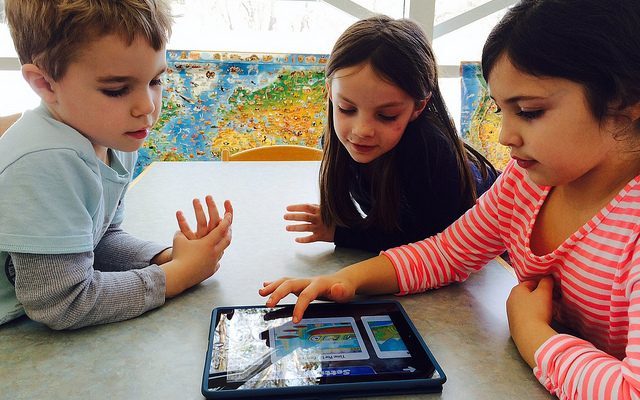Guidelines for Young Children Using EdTech

Technology is ever pervasive in children’s lives. At home, children watch TV, play video games, and spend their days on tablets and phones. Technology is even becoming prevalent in the education of children. However, the younger the child, the less screen time they should have according to the American Pediatrics Association. There is also the added danger of cyberbullying and online predators for educators and parents to consider. With as much fun and help technology can be in the classroom, it is very important that teachers and administrators are careful and selective in the educational technology choices for young students.
The Department of Education has been trying to create guidelines for the role that technology should play in school, especially for younger students. According to the Department, “The rapid pace of innovation in technology provides a seemingly endless stream of new learning options for families and early educators. The goal of the Departments is that all children in every community and at every socioeconomic level have equitable access to appropriate technology in early learning settings and that technology is used responsibly with young children.”
Ponder these four key steps when evaluating and deciding on a specific educational technology:
- Establish learning goals for the children.
- Identify the hardware or devices you would like to have.
- Analyze features and content of the software/program in meeting learning goals.
- Plan how the educational technology will be integrated into the curriculum.
When considering the breadth and scope of technology to use in younger grades, focus on these guiding tips.
Technology, when used appropriately, can be a tool for learning.
Consider these questions: Does the technology help children to learn, engage, express, imagine or explore? Does it complement and supplement learning and not replace learning? Will it help individual students with their own growth and development? Is it following the Common Core and state educational standards, or is it being used for free time? Is the technology age appropriate?
Technology is only useful if it responds well with the ages and developmental levels of the children and is a smart fit with their individual needs, interests, and their social and cultural contexts. Are they being actively engaged with the technology? The Department and Education and the Department of Health and Human Services jointly defined “active use of technology” as referring to what happens in the mind of the child. Are they generating insights, making associations, adding knowledge, or creating their own content? These are important questions to consider since much of the technology aimed at preschoolers and toddlers don’t have this proven research behind it.
One important thing to remember about proper use of educational technology, especially for younger students, is keeping them safe. The Children’s Online Privacy Protection Act (COPPA) protects children under 13 by requiring certain apps or websites to necessitate verifiable parental consent. Schools must remember that any information collected from a child, such as photos or voice recordings, must be protected with security measures. Parents must provide consent to sign students up for online educational programs at school. The Family Educational Rights and Privacy Act (FERPA) also helps protect children’s privacy online when technology is being used at school.
Technology should be used to increase access to learning opportunities for all children.
Is there technology for students to use at the school if they don’t have the resources at home? Are you using technology to take advantage of virtual field trips when physical field trips aren’t part of the school budget? Does the technology encourage global learning and engaging in different cultures? How does the technology support STEM and early learning?
As mentioned before, technology shouldn’t replace learning—it should expand learning. If there isn’t a purpose to the technology, or if some students aren’t able to access the technology, then it wasn’t a good choice.
Technology may be used to strengthen relationships among parents, families, early educators, and young children.
Does the technology encourage communication between staff and parents of the students? Can parents access the technology being used in the classroom? Does the technology help parents become more involved in the school?
Try to include the students’ families with the technology that you use in the classroom. Make sure you are transparent about what technology is used in your classroom. Is there a version that they can download or use at home to continue the learning process?
Technology is more effective for learning when adults and peers interact or co-view with young children.
Are students left alone with the technology, or are they guided by an adult? Does the technology encourage social learning and skills? Are parents or teachers encouraging active use of more passive technology? Are parents or teachers discussing the content or goals for using the technology before students use it? Do parents or teachers view the content with students and interact in the moment? After use of the technology, do teachers or parents engage the children in a de-briefing or extended learning activity?
Technology use for younger students is great—it encourages the inclusion of STEM, mastering skills that will be needed in later education, and creates new learning opportunities. Just remember that technology is the best used in younger classrooms when co-viewed and engaged with an adult. But, don’t forget that physical activity and unstructured play are essential for younger students.





